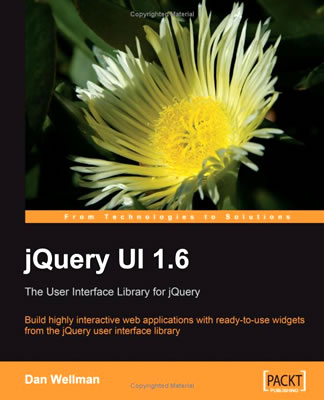jQuery UI 1.6 By Dan Wellman And PACKT Publishing
Last night, I finished reading jQuery UI 1.6 by Dan Wellman (published by PACKT Publishing). Released in January 2009, it's slightly behind the times - jQuery UI 1.7 just came out a few weeks ago. But, even if it's not completely up to date, it is still a great book that covers the fundamentals of the jQuery UI library, all the existing widgets, and even touches on the CSS widget framework (something that was really fleshed out in v1.7).
| |
|
|
||
| |
 |
|
||
| |
|
|
I have never used any of the jQuery UI widgets before, so this is a topic that I was excited to explore. I've been looking for a good UI framework that I could build into and extend within my applications. I know that jQuery is the only Javascript framework that I want to work with, and after reading jQuery UI 1.6, I believe that the jQuery UI library is something that will add tremendous value to my software.
jQuery UI 1.6 is the perfect mix of reference manual and real-world tutorial. It covers every aspect of the jQuery UI behaviors, utility classes, and widgets in a systematic way; but, it keeps it interesting by iteratively applying new ideas to easy-to-follow examples. It does a great job of getting you familiar with all the configuration options, methods, and events, and really gets you to start thinking about where you might apply such aspects in your own programming.
One of the most impressive things about the jQuery Javascript Framework in general is the large amount of functionality that you get with just a little bit of code. The jQuery UI library takes this concept and almost makes a caricature of it; with just a constructor call and some simple settings, the jQuery UI library provides extremely rich, highly interactive features to your software. Take that and then add things like internationalization (i18n) and the ThemeRoller and you have a really robust library with very little effort.
The jQuery framework really brought event-driven programming to Javascript by simplifying and unifying the way events are captured and handled. The jQuery UI library follows nicely on this path. Every action that takes place in jQuery UI widgets or behaviors triggers a number of events, all of which can be listened for and reacted to. For example, with the sortable behavior, dragging an item from list to another triggers the following events:
- start
- activate
- sort
- change
- beforeStop
- stop
- remove
- update
- receive
- deactivate
You'll have to look at the book or the documentation to see what each of these events represents; but, with such a robust event model, the jQuery UI library gives you ample ability to monitor and react to all aspects of the UI library behaviors. The jQuery UI library black-boxes its implementation, but it gives you plenty of opportunity to follow along and even modify the way things are working.
The jQuery UI library is narrow in its API but extremely deep in its functionality. Learning how to leverage its entire set of features is not going to take place overnight. But, for anyone looking to get more comfortable with the jQuery UI library, I highly recommend jQuery UI 1.6 by Dan Wellman as a starting point. Like I said above, it's the prefect mix of real world tutorial and reference manual. It will get you solid on the basics and itching for mastery.
Reader Comments